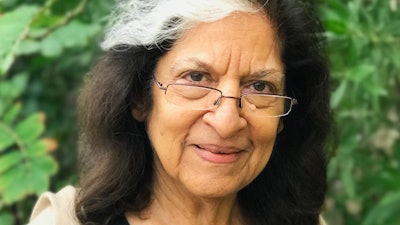 Dr. Farhat Moazam
Dr. Farhat Moazam
“If you look at the history of ethics — figuring out what’s the right thing to do, etc. — the longest history is connected to practice of medicine,” Moazam says. “So, ethics and medicine have all along had a very close relationship, and you can trace it back to Hammurabi’s Code. Therefore, as a physician, to not be involved in ethics makes you a technician and not really a good doctor.”
Moazam is a pediatric surgeon and the founding chairperson of Centre of Biomedical Ethics and Culture (CBEC), which is housed in the Sindh Institute of Urology and Transplantation (SIUT) in Karachi, Pakistan. She is also the founding chairperson of the department of surgery and the first associate dean for post-graduate medical education at the Aga Khan University in Karachi. In the U.S., she is a fellow of the Institute of Practical Ethics and The Hastings Center, which named her a recipient of its 2022 Bioethics Founders’ Award for her contributions to the field.
“I’m thrilled at getting this award,” Moazam says. “And in some ways, the award is for the work that we’re doing through our center in Pakistan and also with some of the work that I’ve been involved in in bioethics with the [World Health Organization (WHO)] and with the International Association of Bioethics. The award recognizes not just the international involvement I’ve had in both ethics and institutional building, but really a recognition of our part of the world. I feel really pleased that this is a recognition of this part of the world for the work we are doing here.”
According to the Hastings Center, Moazam was a board member of the International Association of Bioethics 2009-2014 and has worked with WHO on matters such as international guidelines for ethical transplantation of human organs and tissues.
CBEC, inaugurated in 2004, is the only bioethics center specific in its focus on bioethics research and education in Pakistan, according to Moazam. The center works to build capacity in the field, educate practitioners, conduct biomedical research, and examine medical ethics.
Moazam holds a master’s degree in bioethics and a doctorate in religious studies from the University of Virginia.
“And it was after I trained and practiced in the U.S. for quite a while, when I went back to Pakistan, it was very clear that my surgical skills are what I did exactly the same … but in Pakistan, the practice … occurs in a society that’s very different,” Moazam explains. She says Pakistan “has its own sets of values, its norms, the way families and kinships are. That was the reason that I got really interested in looking [into] and studying ... contemporary bioethics as a discipline in detail.”
One such example of Moazam’s scholarly works is her doctoral dissertation, “Bioethics and Organ Transplantation in a Muslim Society: A Study in Culture, Ethnography and Religion.”
“The research and my publications related to bioethics touch upon what was called cross-cultural ethics,” Moazam says. “There are not too many voices in bioethics from this part of the world, because bioethics is still very dominated by an American paradigm, which is a secular, rational paradigm.” She adds that through her work, she hopes “that what is right and wrong is influenced by local culture and context, that this has also found a place in the international discourse that occurs in bioethics.”















